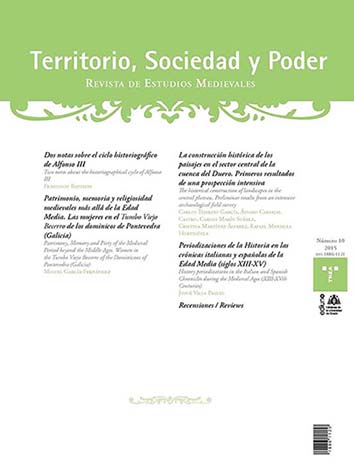Resumen
Resumen: En la voluntad humanista de estudiar el pasado por medio de métodos críticos se lleva a cabo, junto a una crítica filológica, una ordenación de los procesos históricos con objeto de facilitar su comprensión. Las etapas resultantes están determinadas por sucesos políticos que, según el pensamiento bajomedieval, constituyen hitos por sus repercusiones posteriores. Este artículo analiza la herencia clásica y escolástica, y las innovaciones humanistas, en la elaboración de cronologías seculares tanto de la historia universal (vinculada a la idea de Imperio) como regional de distintas formaciones políticas italianas (Florencia, Bolonia, Milán y Venecia) y españolas (Castilla, Aragón, Navarra y Portugal). El análisis comparativo de las periodizaciones realizadas en ambas penínsulas permite comprobar tanto originalidades como influencias recíprocas.
Palabras clave: Historiografía, humanismo, cronística bajomedieval italiana, cronística bajomedieval española, pensamiento político, cultura y mentalidades.
Abstract: When humanists study the past through a critic methodology they accomplish a documentary critic and a historic process in order to ease its understanding. The periods they establish are given by political events seen as milestone within late medieval thought because of their later effect. This study analyses the influence of the Classics, Patristics and Scholasticism, besides the original thought in the composition of History lay chronicles. Periodizations are made for both universal and Italian or Spanish regional History. Universal periodizations are tightly related to the empire idea (potestas universale). The dignitas is considered to persist in Constantinopla after the Western Roman Empire disappearance, restored by Charlemagne in the year 800 (restauratio imperii) and consolidated by Otto I in the Holy Roman Empire (traslatio imperii). In order to study the regional periodizations the Italian chronicles have been divided into four geographic groups: Republic of Florence, Bologna, Duchy of Milan and Republic of Venice. Its main authors and their studies will be pointed out. The first part of these chronicles, although regional, present several common historic milestones related to the Creation, the Flood, the Tower of Babel, the Trojan War, the founding of Rome, the Ostrogothic domain, the Longobardic conquest of Italy and the character of the respective contemporary governments; to these events must be added the the different foundations of Episcopal sees and other particular events. The chroniclers studied are Giovanni Villani, Baldasarre Bonaiuti, Leonardo Bruni, Matteo Palmieri, Niccolò Machiavelli… for Florence; Boncompagno da Signa, Tolosano, Niccolò da Ferrara, Giovanni Cocchi, Matteo Griffoni, Girolamo Borselli, Cherubino Ghirardacci… for Bologna; Ogerio Alfieri, Galvano Fiamma, Pietro Azario, Bonamente Aliprandi, Bernardino Corio… for Milan; and Andrea Dandolo, Flavio Biondo, Bernardo Giustinian, Marco Antonio Sabellico… for Venice. The Spanish chronicles are also arranged for four groups related to geography (Crown of Castile, Crown of Aragon, Kingdom of Navarre and Kingdom of Portugal). All of them relate the Spanish History until the Christian reaction to the Islam (711), explaining the national origins through Tubal and Hercules, and the Roman and Visigoth domination, as suggested by Rodrigo Ximénez de Rada and Alfonso X in Estoria de Espanna. The studied chroniclers are Pablo de Burgos, Alonso de Cartagena, Rodrigo Sánchez de Arévalo, Alvar García de Santa María, Diego Enríquez del Castillo… for Castile; Tomás de Canellas, Jaume Domenech, Pere Tomic, Gabriel Turell, Pere Miquel Carbonell, Joan Margarit… for Aragon; Carlos de Viana for Navarra; and Fernão Lopes for Portugal. Italian and Spanish chronicles are studied from a comparative perspective and each author specifically examined, paying attention to the peculiarities and influence between both peninsulas.
Keywords: Historiography, humanism, late medieval Italian chronicles, late medieval Spanish chronicles, political thought, culture and mentality.

